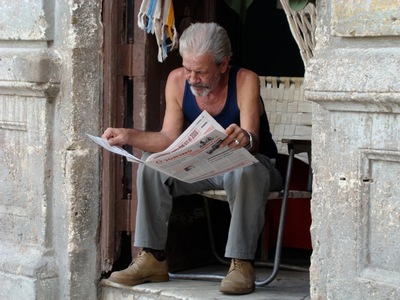Special to the Huffington Post.
Every day at half past six we have breakfast while watching the first morning news magazine on Cuban TV. Around nine, an elderly retiree who buys the newspaper to resell it as a way to earn a few pesos, brings us the daily Granma, and at eight in the evening we tune in again, this time to the National Television News. By the end of the day we have learned what the Cuban governments allows its citizens to know.
Fortunately, there are parallel sources. One of them is our friend Manolo, whose aunt has installed an illegal satellite dish inside a supposed water tank on her roof. She tapes the programs from Mexico or Florida, makes copies, and sells that at a price that allows her to live without formal employment. Another friend takes a turn on the internet once a week in a European embassy, where he surfs all the sites which are blocked on the connections ordinarily available to Cubans.
We, also, form a part of this alternative news exchange, because in the brief moments when we connect to the internet to feed our respective blogs, we download the most interesting articles about Cuba and the rest of the world appearing in the foreign press. When these informal news transmission systems fail us, we appeal to Lola - a rumor mill specialist - who is said to be able to guess what was discussed at the most recent meetings of the top leadership.
We realize, however, that being informed is like a disease, one whose most visible symptoms are permanent irritation, distrustful paranoia, and a sensation of being one of the few who remain awake in a land of sleepwalkers. Sometimes we feel compassion - or is it envy? - when faced with those who only hear or read the triumphalist headlines about our national reality, or with the pessimism of those who have been convinced that outside our small island, the whole world is in ruins.
This extreme government secrecy reaches sometimes dramatic, and sometimes ludicrous, levels. For example, when two of our highest ministers were dismissed the reasons why were only explained to a select group of party members who were shown a top-secret informative video. Carnivals are canceled and instead of announcing the fact to the population, we are only told we how to get our money back for any tickets we might have bought.
But the government does not only distort what is happening within the country, it does so to an even greater extent with what happens outside our borders. In Cuba, for example, no one has learned through the official media that Saddam Hussein was a murderer, nor that Mugabe is a dictator, and few know that in China and Vietnam there are both millionaires and beggars. Neither television nor radio nor the official newspapers ever hint that in much of the world people enjoy free public education and health care. And many people on this island think that Putin is basically a communist, and that the Basque separatist organization, the ETA, is a political movement enjoying great sympathy among Spaniards.
Yoani's blog, Generation Y, can be read here in English translation.

